"...to create order out of disorder..."
The great PD James, when asked why she wrote crime fiction.
Theakston Old Peculiar Crime Writing Festival, July ‘25
If you’ve read any of my Roman Britain novels, you’ll know they are, in the words of surprised US reader David Hoover, “detective stories set in Roman Britannia!”
They’re also works of historical fiction, a genre whose challenges I’ve frequently discussed in my newsletters. (At the moment I’m working with fellow Sapere authors on a proposal for a panel session at the Historical Novel Society’s 2026 European conference.)
I’m therefore a hybrid author, with a foot in each of the historical fiction and crime fiction camps. Fortunately the differences seem to matter more to publishers and booksellers than to readers and writers. The delightful consequence is that in either sphere, I can meet like-minded people, and relish the company of enthusiasts and greats alike in either camp.
And so to the 2025 apogee of crime book festivals, the Theakston Old Peculiar Crime Writing Festival, rightly described by its chief sponsor as “world’s longest-running and most prestigious celebration of crime writing”. At a time when AI has the world of publishing in chaos, and many prestigious literary festivals are flailing around in search of funding and sponsorship, Simon Theakston was a reassuring presence to open the 2025 festival. Simon was on stage along with programming chair, spy thriller superstar Mick Herron — and a line-up of the dark nectar itself. Along with a generous, and heavy, array of crime fiction for delegates to take home in goodie bags.
This was my first year at Theakstons. It’s been held since 2003 in the famed Old Swan Hotel at Harrogate, Yorkshire. If that rings a bell, you’re right. The Old Swan was where Agatha Christie famously took refuge when she disappeared from the public gaze in 1926. It’s the perfect venue, dripping with atmospheric character and large enough to house an events marquee for 700, and the huge Drinking Detective tented bar.
Because we crime writers (and readers) have reputations to live up to, you know. Never mind scribbling alone 360 days of the year, in attics, kitchens, coffee shops or garden sheds (in my case). Come July, we switch personalities. We come to Harrogate with our hardboiled, cosy, noirish, and sleuthing faces to the fore, licences to kill in our pockets. Good times will be had, if it kills us.
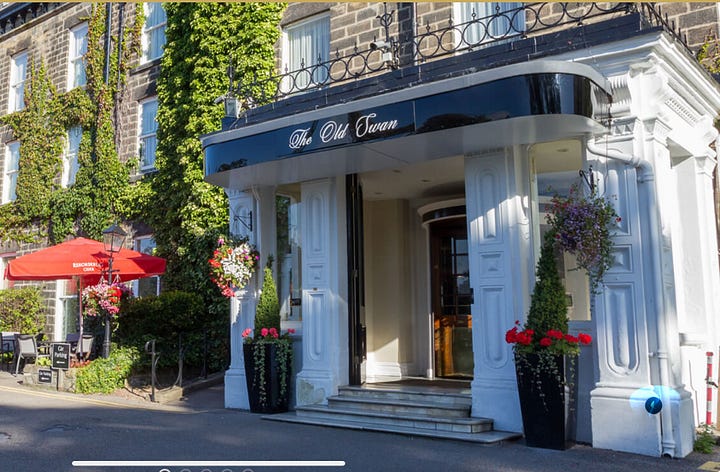
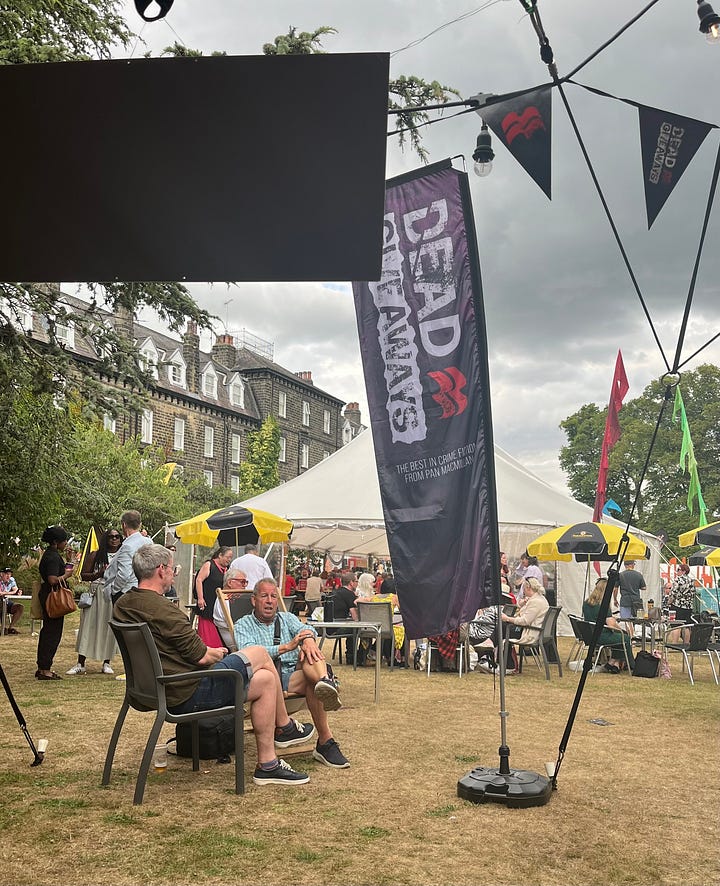
I arrived on a torrid Thursday afternoon in time for the annual awards presentations. I was secretly barracking for Abir Mukherjee’s new thriller Hunted, and was both smug and pleased when it carried off the coveted Novel of the Year award. The delightful and talented Elly Griffiths was honoured with 2025’s Outstanding Contribution to Crime Fiction award. Best of all was the terrific after-party, little of which I can remember. (I do recall the polite and understanding young Irishman who I burdened with my views on Brexit. Apologies, Declan/Rory/Padraig, and thanks for the cider.)
And so it went on, for another three days. It turns out that crime writers — once freed from their garret shackles — are the most convivial people on the planet, and their readers are amongst the most knowledgeable and enthusiastic of booklovers. I had previously noticed these benign characteristics among my local Malvern Crime and Coffee library group; I now know they are universal traits. As for the writers, I have never seen so many giants of literature as genial and relaxed as they are at Harrogate. Not just on the stage, or when signing books, but in the beer tent, at the author dinners (special thank you to Emma Christie who hosted my table), and all around the Old Swan grounds. Genuine warmth and approachability was the order of the day.
The whole place was heaving with the biggest and best names in the business. Among the highlights for me were events featuring AA Dhand; Nick Harkaway; Louise Doughty, Mick Herron (several times over — where does he get all that energy from?); Mark Billingham; Irvine Welsh, interviewed by Abir Mukherjee; New Bloods Daniel Aubrey and RS Burnett, both names to watch; Sarah Hilary; Ben Aaronovitch; Chris Hammer; Kate Atkinson in conversation with Lee Child; Janice Hallett and John Finnemore; and the incomparable Queen of Crime herself, Val McDermid, was omnipresent.
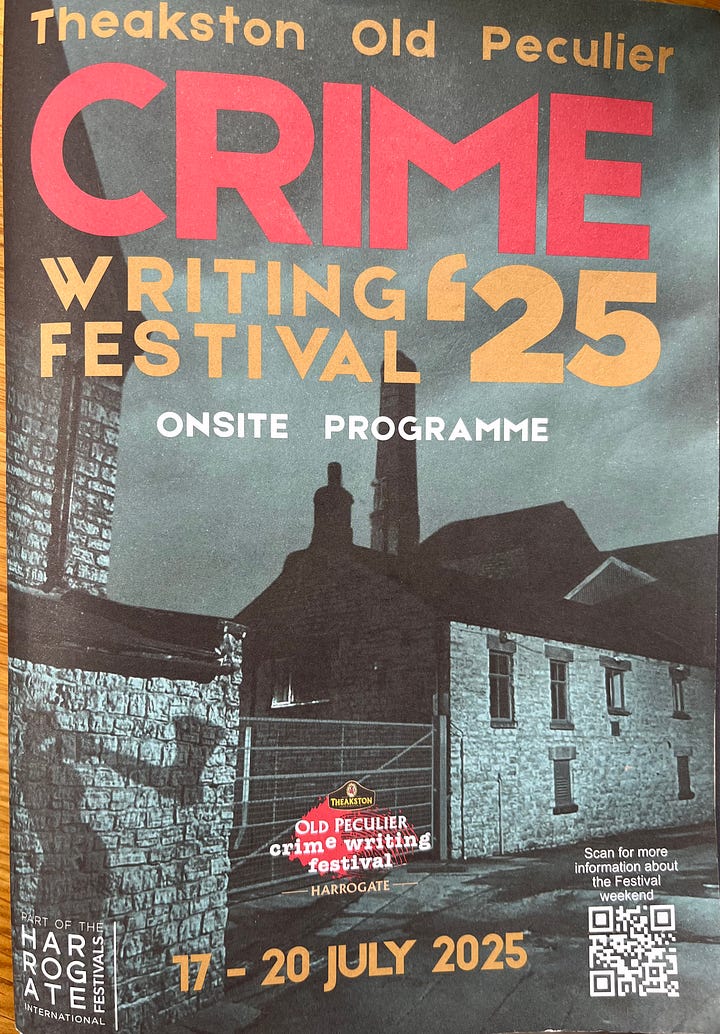
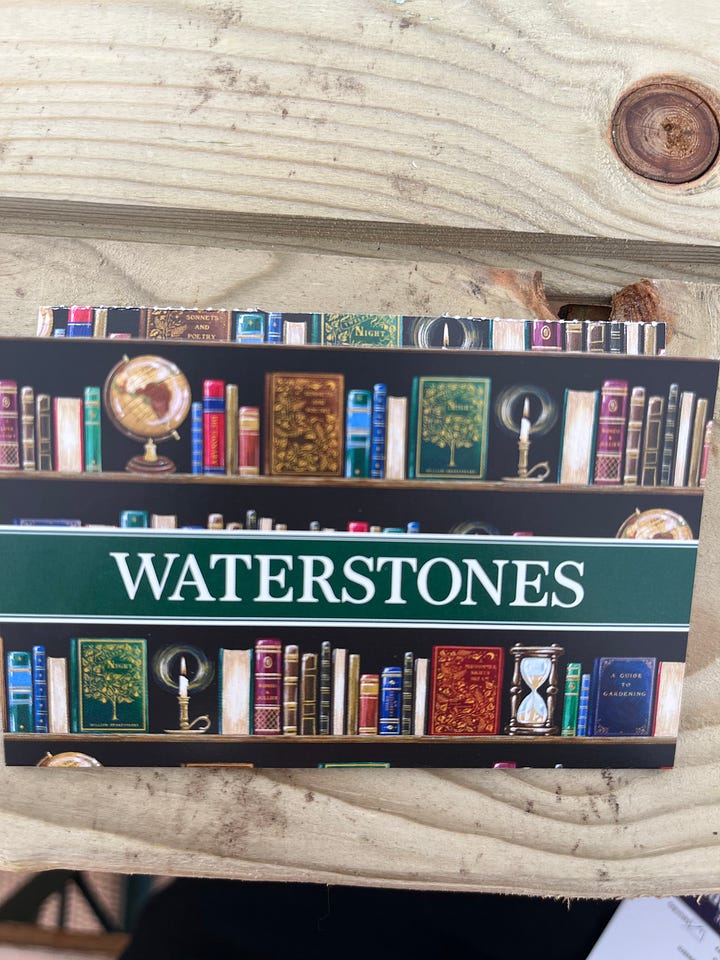
I met dozens of other writers and readers, all a joy to spend time with. Special shout out goes to Aussie/Lancs Liz, whose sleuthing powers secured for us the Mick Herron mystery dinner table prize, a coveted Waterstones token each.
Going home was quite the letdown after such an extraordinary long weekend, but I comforted myself with placing an early bird booking for Theakston ‘26. I’ll be back.
I was left wondering why we read and write crime. By some estimates, crime fiction has become the most popular genre in the UK. The more difficult and challenging life and the world in general becomes, the more popular crime reading is. Why? here’s what I think:
It’s engaging. People are fascinated by other people’s lives, and crime offers the broadest possible perspective on people and their behaviour, including the darkest aspects of human psychology.
It’s suspenseful. Crime novels, whether it be a cosy full of retired colonels and elderly spinsters in a Cotswold village, or an urban noir with a demoralised detective chasing a vicious serial murderer, or even a high concept thriller, with the fate of the world hangs on the lonely endeavours of an overlooked scientist — all of these are narratives full of cliffhangers, twists and turns, red herrings and increasing tension. Crime novels are page-turners.
It’s about justice: right winning out, and baddies getting their just desserts. We all love the satisfaction of Poirot fingering the culprit, and Moriarty paying the price for evil.
It’s brain-teasing. The whole premise of crime and thriller fiction is to set the reader a puzzle, engaging the little grey cells to solve the crime.
To judge by the talent on display at Harrogate, writers also flock to the genre. Which brings me back to PD James. As she said, crime writing is an exercise in bringing order into a chaotic world. The detective is presented with a fragmented conundrum of one or more crimes. She is challenged to seek justice for the victims, and to prevent worse happening. He has to overcome doubt, confusion and fear to resolve dilemmas, and bring back peace and equity. Whew! No wonder we all love a good crime story.
My July News
The beginning of July found me and my chauffeur/cameraman/First Reader Peter Rogers in Shropshire, on our latest research trip for the new Otto Cornelius series. We returned to Wroxeter Roman city, where I chatted to English Heritage’s site manager, Kirsty Matthews. Kirsty quickly sharpened up my grasp of the layout of the sizeable Romano-British city of Viroconium Cornoviorum. (It is comparable in extent to Pompeii, for those of you who’ve trudged that city.) We discussed other vital aspects like which merchants sold goods on the upper storey of the covered market; what is under the Victorian farmhouse on site; and whether the Roman road south from Chester (Deva) to Droitwich (Salinae) would have run through Wroxeter (answer: yes.) In case you’re wondering, Salinae comes into Otto Cornelius #2, which I’m beginning to plan in August.
Then a quick dash to Attingham Park, a National Trust estate where a Roman villa has been very recently discovered. (That villa has taken my fancy, and may feature in Otto #3.)
Next day saw another great privilege. I spent a whole morning in the erudite company of Dr Roger White of Birmingham University, one of the leading scholars and archaeologists in the country. Roger has worked on archaeological digs at Wroxeter and its surrounding settlements and forts for many decades. He’s also co-author of the definitive report of the Wroxeter Hinterland Project. He was very generous with his time, and answered so many of my questions, I feel I know Viroconium inside out now. Let’s just say any mistakes in the forthcoming first Otto Cornelius mystery, The Silver Mirror, will be down to me.
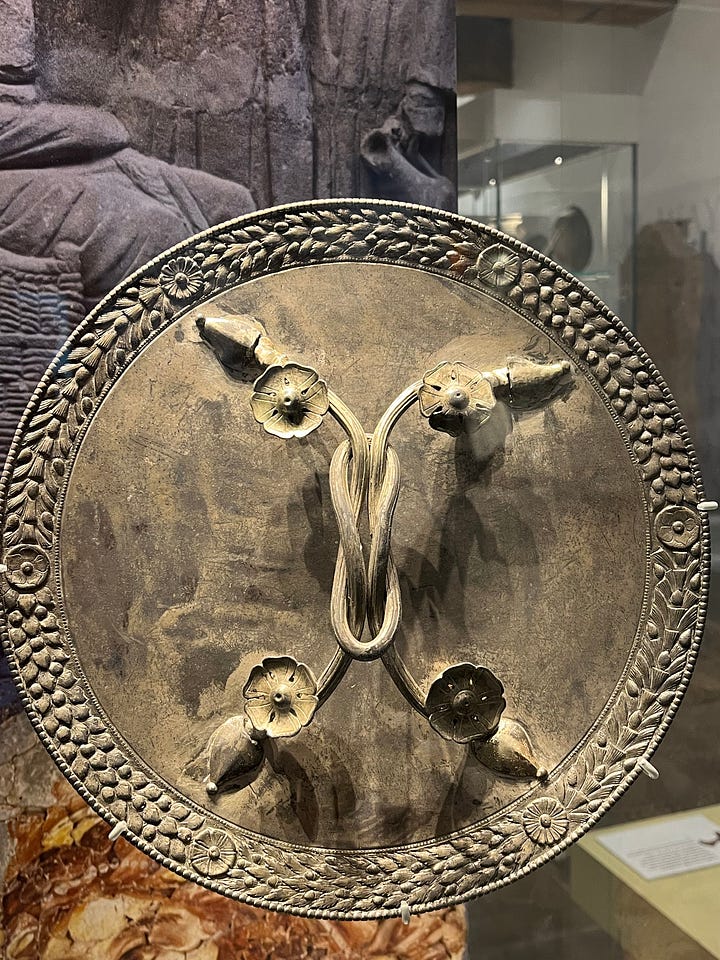
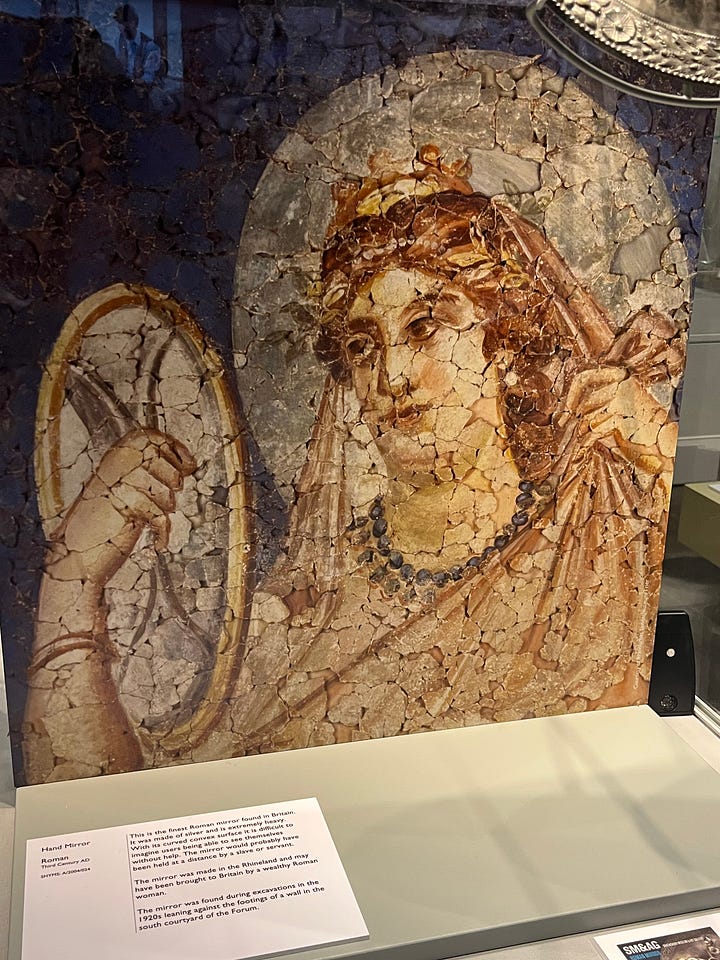
Reminder of the Ross Book Fair, Sunday 17 August, 12-4.
I’ll be with a group of authors at the Larruperz Community Centre in Ross-on-Wye, chatting to readers and signing my Quintus Valerius mysteries. I’ll bring along limited copies of the new historical short story collection, The Ring, in aid of a wonderful literacy charity, The Reading Agency. Do come along for chat and a browse.
Jacquie’s books, short stories, non-fiction articles, social media and Youtube videos can all be reached from her Linktree here.





Sounds fabulous!